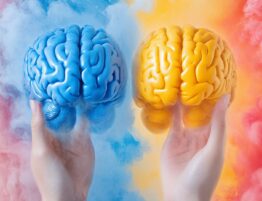Any trauma can affect a person’s everyday life. It can cause great harm and requires professional treatment. Quite often, many people can be diagnosed with post-traumatic stress disorder. It develops following traumatic events that have become very unpleasant in a person’s life. Often, these events are associated with various injuries, accidents, hostilities, or natural disasters. After some time, a person can recover and be physically healthy. However, on a psychological level, these past traumas will cause great harm. It is this disorder that has a negative impact on the work and functioning of the brain as a whole.
The neurological causes of PTSD are negative experiences in the past. These experiences often resurface and make a person feel bad. They may experience increased anxiety and stress on a regular basis and be irritable. Past trauma has a severe impact on the brain, which subsequently leads to poor functioning. The neurological state of a person is disturbed, and they lose a standard quality of life. Understanding how to deal with the syndrome will allow you to return to a normal life. The past should remain in the past forever, and the present life should bring happiness.
The Brain and PTSD: Key Neurological Causes
The brain and PTSD are interconnected, and this condition is strongly affected. Often, after such a syndrome, people can feel changes after a while. These changes affect brain function and activity. Usually, PTSD has a negative impact on some parts of the brain and its functionality. A person may not understand where they are in the past or in the present. A person is often characterized by mood changes, constant anxiety, and stress. Neurological causes can be different and have different effects on the person’s condition. Understanding them will help to resolve the situation and prescribe treatment for the patient. In order to understand the neurological causes of PTSD, it is essential to know which areas of the brain they affect:
- The amygdala. It is essential to understand that the amygdala is located in the center deep in the brain. The amygdala plays a crucial role in warning a person. Often, it is responsible for fear, and under certain circumstances, it allows a person to function. It helps you process various types of threats and make quick decisions. Accordingly, physiological reactions occur in the human brain that help the person. A person with PTSD usually feels fear a little differently. This amygdala helps to assess potential threats but to a greater extent. A person is faced with different stimuli and is often more worried. Even if there is no significant threat, the human brain has an increased physiological reaction.
- The hippocampus. The brain and PTSD are very much connected and also play an essential function. It is responsible for human memory for past memories of various experiences. People who do not have this diagnosis usually remember the past better and can process information more easily. In this disease, the hippocampus becomes much less functional. This functioning does not allow a person to distinguish between past and present experiences. Most often, past events become a trigger for a person, and they experience them in the present.
- Prefrontal cortex. It is the prefrontal cortex that is usually responsible for cognitive functions and the ability to think. In the presence of PTSD, a person often cannot control their reactions. They become much more sensitive to different stress and have different emotional responses. The slightest stress can cause the most severe reaction and lead to a state of depression. The neurological causes of PTSD become more noticeable and do not allow a person to have a normal psychological state.
It is essential to understand that stress hormones have a significant impact on the functionality of our brain. A person who is healthy often has everyday stress and can cope with it. A person with PTSD suffers from anxiety on a regular basis and has elevated cortisol and adrenaline.
Brain Regions Affected by PTSD
It is essential to understand what brain regions are affected by PTSD. PTSD has a negative impact on some parts of the brain, which interferes with their good functioning. These areas are critical for our body and brain as a whole. Changes in them provoke various symptoms and disorders of normal function in the body. It is essential to understand how this disruption occurs and in which parts:
- In our part of the brain, the amygdala is responsible for fear. It begins to react critically when a person faces any threat. In normal health, this information is processed, and a simple response to stress or threat is made. For a person with PTSD, brain function often works a little differently. A person may experience a variety of symptoms on a regular basis that will not allow them to live normally. These symptoms can be accompanied even after an injury or after a threatening action. Often, it is increased vigilance, constant anxiety, and mood changes. It is essential to understand that excessive activity of this body provokes a severe condition.
- Brain regions affected by PTSD are significant for normal brain function. It is the hippocampus that is responsible for the formation of new memories or memories of past experiences. It is usually of average size and helps a person to remember the past and to leave a pleasant experience in the present about the past. A person with PTSD often cannot distinguish between what is happening now and what happened in the past. He or she constantly relives old memories, which causes emotional distress. Usually, a person may experience depression, constant stress, and some threats from these memories.
How PTSD Affects the Brain’s Functionality
Understanding the question of how PTSD affects the brain will allow you to assess all possible risks and consequences. Often, a person with this disease notices a change in the functionality of the brain. It has its own specific consequences, such as constant memory stress and depression. These changes often have a negative impact on a person’s health and general condition. Understanding the problems will help you make treatment decisions. A person with this disease usually experiences memory problems and difficulty regulating emotions. Here are their main characteristics:
- Memory problems. During PTSD, the hippocampus becomes reduced, and this affects its functionality. A healthy person experiences an understanding of the past and the future. A person who has this disease often faces such problems as intrusive thoughts and confusion of memories. Usually, a person can observe various flashbacks and confused thinking. A long-term condition can lead to a deterioration in cognitive function and overall memory in general.
- Problems with emotional regulation. It is essential to understand how PTSD affects the brain in terms of emotional regulation. It is necessary to understand that during this condition, a person may often not be able to distinguish emotions. PTSD causes a change in functionality in the brain. It is this change that causes the inability to differentiate between emotions and to act on them usually. For a healthy person, such fears of being upset are normal, and the struggle with them is also common. People with the disease often become confused, which leads to exaggerated reactions. A typical fear for a person can seem like something colossal and extremely terrifying. People with PTSD have constant mood swings and irritability. These are the symptoms that prevent them from living an everyday life and cause brain dysfunction.
The Role of the Nervous System in PTSD
PTSD and the nervous system are very closely related. People with a healthy nervous system can clearly deal with their anger or reactions. Especially when this reaction is related to stress. A person who has the disease has weaker control over various factors. During PTSD, physiological changes occur, and the brain begins to work differently. It is essential to understand that trauma from the past has a cumulative effect on the nervous system. The body responds to fear and physiological properties.
- A well-known reaction is “fight or flight”, which often has a negative impact on the human condition. During significant stress, the brain malfunctions, and certain hormones are released. These hormones are called adrenaline and cortisol, and they are released in large quantities. A healthy person can usually think through a problem and make a quick decision. For a person with the disorder, various fears and factors become unregulated. This usually results in extreme reactions and uncontrollable actions. The connection between PTSD and the nervous system is enormous, and there is an increase in sensitivity to stress.
- A person with PTSD is often characterized by a chronic reaction. Any stress can become unbearable and cause disturbances to the nervous system. This condition is very bad for the body as it has its adverse effects. They usually manifest themselves in constant anxiety, constant depression, and uncontrollable emotions. It is extremely important for a person with this disease to understand their condition and try to treat it. It is essential to think about your health in order to avoid further complications and malfunctioning of the nervous system.
PTSD Brain Changes: A Deeper Insight
PTSD brain changes cause significant problems for a person’s nervous and psychological state. Often, this disease is not taken seriously, and people think that the problem is only in the emotional state. It is essential to understand that PTSD has a significant impact on the brain and has serious consequences. Being traumatized in the past can often lead to psychological disorders. Such disorders can be not only in mood but can also affect a person’s physiological activity. Memory impairment, constant stress, and anxiety are all consequences of PTSD.
- Long-term changes. During PTSD, a critical part of the brain changes: the hippocampus. It becomes much smaller, which contributes to the deterioration of memory, cognitive abilities, and thinking. This is the name of the ability to distinguish where a person is, and the difficulty of distinguishing between past and present. PTSD causes profound brain changes that become an obstacle to everyday life. It is essential to know that the human brain has an almond-shaped structure. It is the body that is responsible for emotions, the human condition, and reactions to various stimuli. During illness, this structure becomes hyperactive, which causes a dysfunctional reaction. This reaction is manifested in constant anxiety, acute reactions to fear, and tension.
- Neuroplasticity. During this disease, constant medical supervision is important to improve the condition. Neuroplasticity offers hope for recovery. Neuroplasticity itself means the formation of new neural connections in the brain. This allows you to take a step towards treatment and be healthy in the future. Special therapies have been introduced to improve a person’s condition. They are also aimed at treating and restoring processes in the human nervous system.
Neurological causes of PTSD interfere with daily life. Studies show that the latest imaging technologies help to find these symptoms. The newest treatment methods are also being introduced to improve a person’s condition. Understanding why PTSD occurs and how to overcome it allows you to make the right decisions.
Conclusion: Navigating the Complexities of PTSD from a Neurological Perspective
It is essential to understand that PTSD causes profound brain changes. During a past trauma, a person’s memory retains a response to its impact. Over time, this trauma can have a severe effect on the brain and its functionality. Trauma causes physiological changes in the brain that affect the psychological and nervous state of a person. The hippocampus and the amygdala are most affected. In the first case, the hippocampus becomes smaller, which causes memory disturbances of past and present events. This condition is serious for a person and can cause constant stress and tension. In the second case, the amygdala becomes more sensitive and becomes hyperactive. In turn, this provokes changes in a person’s mood and responses to various factors such as fear or stress. A person cannot fully control themselves and is often stressed and nervous. Understanding these causes and how PTSD and the nervous system are connected will help to find treatment methods. A timely visit to a doctor is a key to effective treatment and better health outcomes. The latest technologies and therapies will allow a person to improve their condition. Neuroplasticity is also important, as it helps the brain form new neural connections. Attention to your health is the most essential thing, so this therapy can be highly effective.













Please, leave your review
Write a comment: